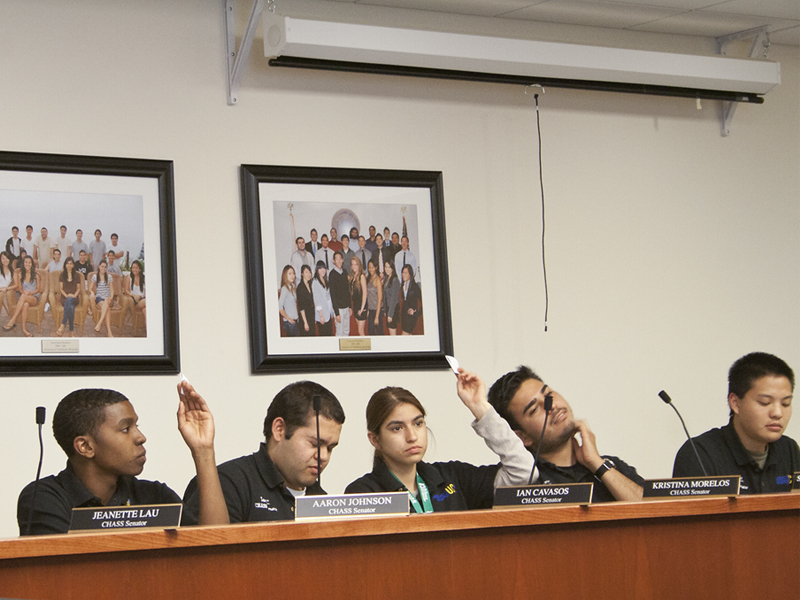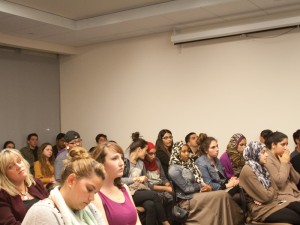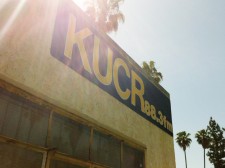
Held under the premise of a secret ballot vote, ASUCR senators voted on a series of controversial resolutions including one to end funding to companies accused of supporting apartheid, particularly in Israel. The legality of voting procedures is being questioned, which raises issues of transparency for the undergraduate student government. The ASUCR constitution and bylaws set ambiguous guidelines for setting a secret ballot vote.
Audience members bundled together like blood clots along the arterial walkway of the Senate Chambers on Wednesday, March 6, as galley seats filled to the brim. The anxious students, alumni and staff members awaited the results of the five different votes to be held that evening.
Senators were confronted with the difficult task of voting for or against a resolution, entitled the Divestment of Companies that Profit from Apartheid, amidst an outspoken crowd of pro-Israel and pro-Palestinian speakers. In deliverance of the finance and committee hearing report, ASUCR senators overturned a bylaw and approved a senate stipend increase of 65% for the duration of the 2012-2013 academic year.
Following the vote on the stipend resolution, senators also passed a KUCR referendum and a constitutional amendment for proportional representation. A referendum for the reinstatement of the trolley system was not passed. Approved pieces of legislation will be placed on the spring ballot and voted upon by the undergraduate student body.
Closed ballot voting
Parliamentarian Chris Sanchez explained that a closed ballot session was held at the request of the senate. The tallied results for all resolutions and referenda were disclosed to the public at the time of the session, but each individual senators’ votes were not disclosed. After the senators voted, all ballots were shredded.
“I’ll be the only one to see this,” ASUCR Executive Vice President Armando Saldana said about the ballots. “This information is not going to be disclosed for any reason and these will be shredded afterwards.”
Some of the senators requested a closed ballot due to safety concerns and pressured glares from the galley. Senators contest that the vote was closed to protect senators due to the politically-charged nature of the divestment resolution discussed. A few senators claimed they received threatening emails soon after the senate meeting.
At the request of the Highlander, five out of the 16 senators were willing to disclose their votes to a few or all of the resolutions. Senator Megan Crail voted against the divestment resolution, yet explained her reasoning behind the vote. “The resolution does not fully represent the diverse student population at UCR and marginalizes particular groups on campus. Furthermore, there was not enough time or opportunity among Senators to discuss the resolution due to public forum, and there was not a presentation of the issue from both perspectives,” she said.
Issues of transparency in UC student governments have arisen in recent years, notably at UC Berkeley, UC San Diego and UC Santa Barbara. In all three instances, student organizations urged their governments to comply with California’s Ralph M. Brown Act, which requires legislative bodies to comply with strict guidelines of transparency and openness. Several related laws have applied such restraints to student governments at the California Community College and California State University systems, but due to the autonomy of the UC Board of Regents, the law does not currently apply to the UC. As of now, UC student governments are only accountable to the rules they set for themselves.
The ASUCR Constitution states that the legislative branch may “conduct all votes pertaining to personnel matter by secret ballot.” Chapter I and Section 12 of the ASUCR bylaws states, “The Senate Chair has discretion to make any vote a secret ballot vote,” which permits the senate to make a secret ballot vote.
The aforementioned guidelines set vague criterias for setting closed voting sessions, which limit transparency to the general public. The Senate Chair is responsible for deciding whether a meeting can be held on a open or closed ballot basis. The Highlander attempted to contact ASUCR President Pro Tempore Sai Patadia, chair of the constitution and bylaws committee, and Executive Vice President Armando Saldana, yet they did not return requests for comment.
In February, Saldana called for “limited discussion” about legislation during senate meetings. He referred senatorial concerns and questions to the Legislative Review Committee, where legislation is edited and properly formatted in a closed meeting. Senators questioned whether squelching debate would provide enough transparency during senate meetings, while others suggested opening up the LRC meetings to the public.
Acting as an alternative legal oversight over the senate meetings, the ASUCR Judicial Council provides an outline of the role of each justice and functions with their Rules of Procedures. In Nov. 2012, the Judicial Branch attempted to establish a Judicial Review Board within the senate. Due to the conflict of interest over appointing senators as justices, the idea was immediately discarded.
The instatement of the judicial branch signified greater accountability for a senate that was immersed by controversy back in spring 2012. The unprecedented nature of last week’s senate meeting leaves to question whether the judicial branch should play a more active role in conducting and overseeing all legal proceedings. Limited information is available online for contacting judicial members and a mission statement for the branch has yet to be established.
Audience members divided over divestment resolution

The audience was enveloped with students from Highlanders for Israel, Hillel, Students for Justice in Palestine and other organizations such as the Catholic Student Fellowship. The divestment resolution called for UCR to discontinue funding from companies that offer financial support to Israel’s occupation of Palestine. An excerpt from the resolution reads, “Certain companies have promoted and been complicit in these ongoing human rights violations systematically committed by the Israeli government.”
Senators risked stirring the calm waters between Middle Eastern student organizations on campus by voting on the resolution, as indicated by the passionate dialogue between speakers on both sides of the legislation.
Tensions enraptured the audience members, who often invoked broad issues surrounding the Israeli-Palestine conflict. Passions remained high throughout the senate meeting.
The public comment period was periodically extended to allow both sides to speak.
Senators extended the prepared speaker’s list over three times in order to offer fair representation from the opposing parties, which consisted of most of the audience.
Introducing the resolution was Director of Academic Affairs Shadi Matar. Stripping off his ASUCR black polo and his Students for Justice in Palestine t-shirt, Matar came before the senate as a UCR student. He wanted to signify the separation between his identities as a campus representative from both organizations.
He gave a 14-minute presentation outlining the effects of what he describes as an apartheid. Calling it “institutionalized racism,” Matar explained how the apartheid requires certain Palestinian citizens to carry identification cards that classify their ethnicity and religious views. Also, according to him, Hewlett-Packard (HP), Caterpillar and Raytheon are companies that support Israel’s occupation of Palestine and the racial discrimination that it entails. HP, for example, supplies machines to Israel that require Palestinians to register their thumbprints to an electronic database. Matar concluded by urging the senators to pass the resolution to end the investments in apartheid programs such as these.
Once he finished, the senate allowed members of the audience from each side to present their opinions on the resolution.
Speaker Jonah Myers condemned the resolution, stating that Israel’s current system does not promote any kind of racism or religious division. The pro-resolution side disagreed and argued that the resolution was an opportunity to change the status quo in Palestine and Israel.
As a child of Jewish refugees, anti-resolution speaker Philippe Assouline accused the opposing side of offering skewed facts about the events taking place in Israel. “Everything you heard… is false,” he declared. He described Israel as a system of democracy with cultural equality throughout the state, refuting the claim that there is institutionalized racism in the land.
Alfonso Ruiz-Delgado, a fourth-year history and ethnic studies major and representative of the student-led organization MECHA, spoke in favor of the resolution. He stated, “We as a group support it. Not only that, but as a human being, because if it was my people getting hurt, I would be doing the same thing right now.”
Tensions developed between Assouline and Shaheen Nassar, a former member of the UC Irvine 11 and UC Riverside alumnus. “Excuse me, your session is over!” shouted Nassar to Assouline, who exceeded his time limit of two minutes.
Other speakers included ASUCR President Liam Dow and Vice President of External Affairs Lazaro Cardenas, both of whom held opposing viewpoints on the resolution.
Senator Chris Salvador disagreed with the decision to allow ASUCR members to address the situation, stating that ASUCR representatives should remain neutral during the public forum. “Public forum should be for the public,” he said. His concerns were dismissed as Parliamentarian Chris Sanchez clarified as long as the ASUCR members are not voting on the issue, they would be allowed to speak. Dow and Cardenas, both part of the Executive Branch, were not voting on the issue and were permitted to speak.
Dow spoke first and referred to a letter sent by the president of UC Davis’ student body, Rebecca Sterling. The letter urged the ASUCR Senate to reject the resolution. The reason being that the passing of the resolution would not represent the student body at large.
As indicated by the letter read by Dow, this issue has affected other UC campuses. On the same day of the meeting, the UCLA Undergraduate Students Association Council emailed a letter to ASUCR, condemning the divestment resolution as “inappropriate and unacceptable.”
In Nov. 2012, the Associated Students of UC Irvine overwhelmingly passed a divestment resolution on their campus. Back in 2010, UC Berkeley also approved a similar resolution, but the student body president, Will Smelko, vetoed the motion. The student government of UC San Diego will be voting on their own divestment resolution in mid-March.
Speaking apart from his ASUCR position, Cardenas went on to remove his senator shirt in order to represent the local Riverside organization, United Students Against Sweatshops (USAS). He advocated in favor of the resolution and stated, “I believe it’s recognizing the companies and not the groups.” He opposed the use of student tuition and fees to fund corporations that have been accused of abusing human rights.
A short two-minute break was given to the senators prior to the vote. When they returned to the chambers, the senators voted on a closed ballot. After a few minutes, the votes were counted, and the resolution passed with a two-thirds majority, 11-5.
The supporters of the resolution rose from their seats and celebrated the passing of the resolution. Within minutes, the side opposing the bill quietly exited the room long before the conclusion of the meeting.
The aftermath
A day after the senate vote, Chancellor Jane Conoley took a neutrality stance on the topic, stating that ASUCR’s resolution is not reflective of campus policy, according to a press release. “It is important to note that such divestment is not the policy of the University of California system nor of UC Riverside,” the statement read. “Moreover, The UC Board of Regents requires this action only when the U.S. government deems it necessary. No such declaration has been made regarding Israel.”
Students for Justice in Palestine President and ASUCR Director of Academic Affairs Shadi Matar spoke briefly of the results and how relieved he was. “Honestly, I could not believe this happened,” he said. “Hopefully it’ll be the first step in a bunch of steps to bring a better situation for people in Palestine and to make students more aware of where their money is going and for the school to be more responsible of where they’re spending their money.”
Alyssa Gray, a fourth-year undergraduate and president of the Catholic Student Fellowship at UCR and RCC, was one of the first speakers who spoke on behalf of the pro-resolution side.
“I believe that this legislation will not divide our campus but rather open up a much needed line of communication between differing sides. Though the legislation is a catalyst that exposes the already existing divide, I trust that the maturity on our campus will prevail in allowing an open and honest discourse about humanitarian efforts in general and the Israeli-Palestinian conflict specifically,” said Gray in an email interview with the Highlander.
Other audience members held the belief that the resolution was detrimental to the peaceful campus climate for students.
The Highlander received a letter from Jacqueline Zelener, the president for Highlanders for Israel (HIFI), who expressed feelings of betrayal from SJP for keeping their plans under wraps. She states that Hillel and HIFI were given 20 hours notice prior to the meeting and that the resolution fuels the incurring division between Middle Eastern students on campus.
“Up until this point, the organizations freely shared information about upcoming plans and events out of mutual respect,” she said. “Despite the internal progress made between the students while working on the [Middle Eastern Student Center] MESC, this Senate meeting quickly differentiated those who are Pro-Israel from those who are Anti-Israel,” said Zelener about two-year preliminary planning stages into the MESC. She says the center is purposed with fostering discussion among marginalized student organizations associated with Israel, Palestine and other Middle Eastern countries.
Trolley referendum loses steam in the senate

Other pieces of legislation were also voted on during the meeting. In an effort to bring back a safe and sustainable mode of transportation to campus, Senator Brian Leung vouched for a referendum to reinstate the trolley system. Due to dissenting opinions throughout the senate, the trolley referendum failed to gain a majority by a close margin of eight in favor, seven opposed and one abstaining.
The trolley referendum sought to increase student fees by a maximum of $28 per quarter in order to reestablish the campus transportation system. The charge would have been contingent upon the financial support of Transportation and Parking Services (TAPS), in order to cap student fee increases.
“As of 2011, UCR is one of the only two campuses in the UC system that does not provide its students with a dedicated shuttle service,” stated the resolution. Leung expressed this as “completely unacceptable.” As a former intern at the San Francisco Municipal Transportation Agency in 2011, Leung sought to use his experience to address inefficiencies of the trolley such as reducing the wait time between shuttles, alleviating bottleneck student traffic and finding local points of interest for students.
UCR’s trolleys were sold to UCLA in 2011. Alternative modes of transportation offered by the university are limited to vanpool programs and the RTA. Due to overwhelming demand and limited supply, TAPS has even instituted a waitlist for parking permits, according to Leung.
Cardenas expressed a few points of contention with the referendum, including the establishment of an oversight committee, which would consist of four administrators from TAPS but only three ASUCR representatives. The representatives would include the Vice President of Internal Affairs Kevin Jo, who sits on the Task Force for Campus Safety.
“In the first two months of this year alone, there were seven instances of armed robberies. Those instances happened when students were going to and from school—80 percent of those cases,” said Leung.
In response, President Dow said, “I think we need to solidify the language within this referendum before we vote to pass it as students and I think that would be a very important step to do more.” Dow went on to commend Leung for his continual work on improving student wellbeing and safety on campus. “I do believe that this is very vital to our campus and for connecting the campus to our community,” said Dow.
Senator Aaron Johnson felt that the undergraduate body should be given the opportunity to vote on the referendum. “It’s not really a matter of our personal opinion, although passing this would give the choice to the students. As a matter of urgency, I think safety’s a big [priority] on our university and [so is] a lack of a transportation system…” he said.
Constitutional amendment pushes for equal collegiate representation
The senate passed a resolution to place a constitutional amendment of proportional representation on the upcoming spring ballot.
In a constitutional amendment co-authored by Senators Ian Cavasos and Kristina Morelos, the process of proportional representation will be included in the latest ASUCR Constitution or bylaws. The senate is traditionally elected through proportional representation, but the process was never formalized.
Senators voted to place the constitutional amendment on the upcoming spring ballot after having tabled the legislation in a previous meeting. A special Legislative Review Committee meeting was also held the same day, in order for senators to review the amendment prior to voting on the legislation during the senate meeting.
“I am glad senate finally approved this constitutional amendment, however the amendment still needs to be voted on by the student body. Hopefully, we have been able to write the legislation more clearly so that the students can decide whether this is a needed change or not,” said Cavasos.
In April 2012, the ASUCR senate transitioned into a three-branch system, which consists of the executive, legislative and judicial branches. The constitutional amendment will add four more senate seats on an “at-large basis,” and the seats will be filled by the four highest runner-ups from the colleges of CHASS, SOBA and BCOE. This would bring the number of senators up to 20 from the current 16.
“With any legislation, whether it gets approved or not, at least a voice gets heard. I hope that this legislation does pass through in order to ensure more equal representation of our student body,” said Cavasos.
Senators voice support for the campus radio station, KUCR 88.3 FM

Spearheaded by Senator Chris Salvador, the KUCR referendum seeks to increase student fees from $3 to $9.50, which would provide funds to potentially renovate the campus radio station facilities, support new technologies for ongoing music programs and events, and continue high-quality broadcasting in the Inland Empire. Senators passed the resolution by a vote of 14-2.
KUCR, the campus radio station, is one of the longest-serving student-centered organizations at UCR. Started in 1964, KUCR obtained its broadcasting title just two years later. The radio station has been located on Linden Avenue and next to the Aberdeen and Inverness dormitories for the last 47 years.
According to the referendum, “KUCR requires funds to contribute to a building fund which would at some point relocate the station to a modern facility, while still retaining the creative character which has been essential to the station’s operations.”
Salvador argues that the lack of funding is a deterrent towards promoting student involvement, due to insufficient equipment and time slots. At the same time, the deterioration rate of buildings and equipment has slowed technological growth. KUCR last received funding through a student referendum passed in spring 1997.
“As a DJ of KUCR, I realized that a referendum was needed because…our technology is over 40, 50 years old. Sometimes we use eight-tracks. A lot of the materials…are deteriorating yet we do not have the proper funds to save cds, vinyls [and] long plays,” said Salvador.
Greater reinvestment into KUCR may potentially rejuvenate the distant media organization to play a larger role in student life, according to the resolution. The radio station has maintained stagnant operational budgets over the last few years.
“This referendum was necessary to make sure that we can accommodate as many students, who are interested in the musical culture on our campus,” said Salvador.
ASUCR approves 65 percent stipend increase
The senate also held a vote to increase its stipend levels by 65 percent.
Since 2002, the number of enrolled UCR undergraduate students rose from 12,000 to 18,000. The rise in enrollment required a budgetary increase of 82 percent. Chapter VII, Section 7, Letter F of the ASUCR bylaws states that stipend levels are subject to review every three years and a maximum of 25 percent may be granted. According to Parliamentarian Chris Sanchez, since 2002, the stipend levels required three revisions to create a potential 75 percent increase.
However, since enrollment from 2009 to 2012 did not increase significantly, “a reduction of 10 percent was prescribed, thus finalizing to be a 65 percent increase across the board,” Sanchez stated. The senate did not specify why the reduction was prescribed at that exact number.
Also, according to Chapter VII, Section VII, Letter G, stipends that increase over 25 percent must be approved under special circumstances by two-thirds of the ASUCR senate. The senators motioned to suspend the bylaw in order to vote of the stipend increase. The proposed stipend increase was ultimately passed, via a closed ballot, by a unanimous vote of 16-0.
The Highlander will update coverage of the disclosure of votes online at highlandernews.org.








